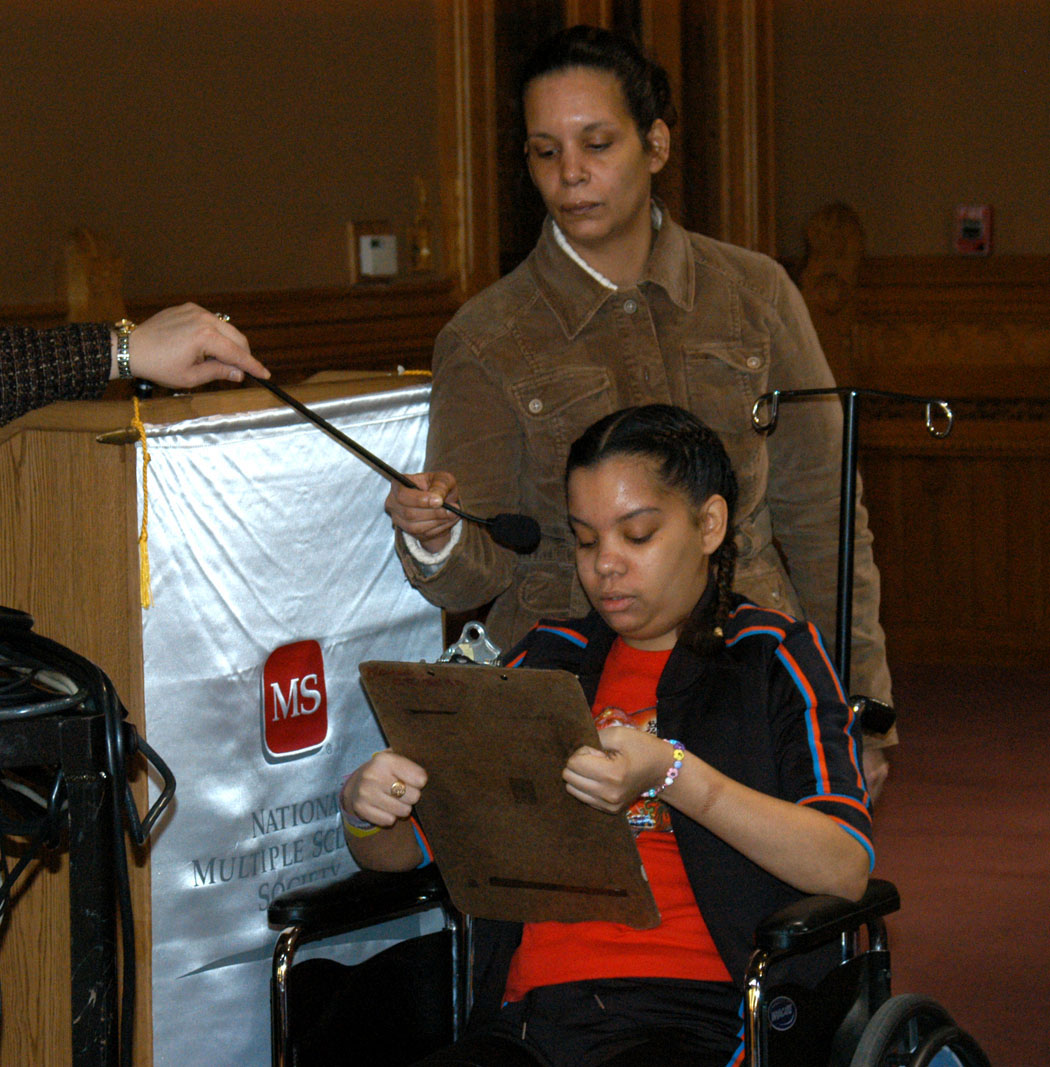|
FOR IMMEDIATE RELEASE
Hartford Teenager Urges Legislators To Support Program Providing Homecare Assistance To People With Disabilities Between The Ages Of 18 And 64
HARTFORD, Conn. On Wednesday, March 28, the National MS Society, Greater Connecticut Chapter and MS activists statewide rallied at the State Capitol Building, urging legislators to support a pilot program providing homecare assistance to people with disabilities between the ages of 18 and 64. Many Connecticut residents with disabilities between the ages of 18 and 64 are not covered by homecare programs, and, as a result, often are prematurely institutionalized. These individuals need assistance with daily activities but have limited family support. As a result of age, many are not eligible for the Connecticut Home Care Program for Elders, which is available only to those 65 and older. Others are ineligible as a result of the Medicaid Personal Care Assistance (PCA) Waiver, which requires that individuals have the strength and ability to self-direct their care. In state fiscal year 2003, more than 7,400 residents under the age of 65 received care in a Connecticut nursing facility. Currently, 10 percent of nursing home residents in Connecticut are younger than age 65.
 Seventeen-year-old Ciara Rivera, in a wheelchair and on a day pass from Connecticut Children’s Medical Center where she is admitted, also attended with her mother, Sandra Collazo. Rivera, who was diagnosed with multiple sclerosis when she was just 15 and already disabled by her disease, asked legislators support the program. At 17, Rivera, who is a resident of Hartford, Conn., qualifies for limited homecare assistance but may not qualify after she turns 18. Seventeen-year-old Ciara Rivera, in a wheelchair and on a day pass from Connecticut Children’s Medical Center where she is admitted, also attended with her mother, Sandra Collazo. Rivera, who was diagnosed with multiple sclerosis when she was just 15 and already disabled by her disease, asked legislators support the program. At 17, Rivera, who is a resident of Hartford, Conn., qualifies for limited homecare assistance but may not qualify after she turns 18.
“Communities need to know how MS affects lives,” said Collazo, who wiped away tears as she spoke passionately to an audience consisting of more than 40 activists and several state legislators. “They need to know multiple sclerosis affects children and young adults that these effects can be devastating forever changing the lives of entire families.”
The Greater Connecticut Chapter and its members encouraged state legislators to support a state funded pilot program to provide homecare to no more than 50 residents with disabilities ages 18 to 64. Such a pilot program is estimated to cost approximately $720,000. Funding for such a program would save the state hundreds of thousands as homecare is less costly than nursing home care. Those with chronic illnesses and disabilities caused by diseases such as Huntington’s disease, Parkinson’s disease, Alzheimer’s disease, multiple sclerosis and HIV/AIDS are likely to be helped by new legislation. Connecticut residents are encouraged to contact key legislators and urge them to support in the fiscal year 2007 budget the Pilot Program to Provide Home Care Services to People with Disabilities Ages 18 to 64. Legislators speaking at MS Lobby Day included State Representative Elizabeth Ritter, Senator David J. Cappiello, Senator Jonathon A. Harris, State Senator Bob Duff, and Representative Christopher G. Donavan, House Majority Leader.
The National Multiple Sclerosis Society, Greater Connecticut and Western Connecticut Chapters hosted the fifth annual MS Lobby Day to discuss with legislators the proposed pilot program and other critical issues affecting people with disabilities. Other legislative priorities discussed included:
More than 6,000 Connecticut residents, like Rivera, battle the baffling effects of MS. Multiple sclerosis is an autoimmune disease affecting the central nervous system. The cause is unknown, and there currently is no cure. Symptoms can include, among other things, numbness and tingling in the extremities, difficulties with vision and speech, stiffness and, in some severe cases, total paralysis. The progress, severity, and specific symptoms of MS in any one person cannot be predicted.
To learn more about MS and ways to join the movement and affect change, please visit www.ctfightsMS.org or e-mail programs@ctfightsMS.org.
3/30/07
Studies show that early and ongoing treatment with an FDA-approved therapy can reduce future disease activity and improve quality of life for many people with multiple sclerosis (MS). Talk to your health care professional and contact the National Multiple Sclerosis Society at www.nationalmssociety.org or 1.800.FIGHT-MS to learn about ways to help manage multiple sclerosis and about current research that may one day reveal a cure.
Karen E. Butler
Vice President of Communications
Greater Connecticut Chapter
tel +1.860.714.2300
cell +1.860.997.4487
JOIN THE MOVEMENT
ctfightsMS.
|
|
|
 Seventeen-year-old Ciara Rivera, in a wheelchair and on a day pass from Connecticut Children’s
Seventeen-year-old Ciara Rivera, in a wheelchair and on a day pass from Connecticut Children’s